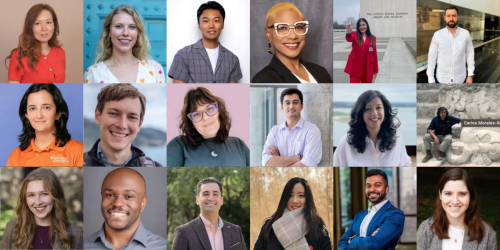
Graduate students and postdoctoral scholars at The University of Texas at Austin are changing the world. They're transforming health care through research and technology, working to find energy solutions and helping to deepen our sense of history and culture.
Read what our students and scholars are doing, and follow us on social media to see even more features. What will you do at UT Austin?
School of Architecture
Emma Martin (she/her)

Masters Student | Architecture
Now interning with Chioco Design as part of the Professional Residency Program, third-year Master of Architecture student Emma Martin supplements her graduate studies with a small business that allows her to use her background in studio art.
“I obtained a bachelor’s degree in studio art and English prior to studying architecture,” Martin said. “Architecture felt like a great way to design and shape the stories of people’s day to day lives in a positive way.”
Kyle Dickens (he/him)
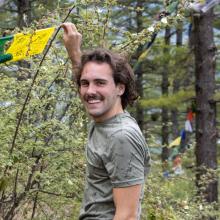
Masters Student | Landscape Architecture
“Landscape architects require a comprehensive understanding of ecological and sociological processes in order to address global challenges,” Kyle Dickens, second-year masters student in landscape architecture, said. “It is not simply a tree or a wall, but a built experience—a transmutation of physical objects into sociocultural volumes.”
Supported by the Architecture and Design Foundation, Dickens traveled to Himalayan agricultural communities to examine the connections between landscape, spirituality, design and policy. For example, Bhutan’s constitution mandates that 60% of the country’s surface remain undisturbed forest, positioning landscape as a primary informant of local architectural design.
Yueying Ma (she/her)

Ph.D. Student | Community and Regional Planning
While large and centralized water treatment systems can sometimes reduce water pollution disparities in urban areas, they may fail to provide equitable protection in rural areas. Yueying Ma, fourth-year Ph.D. student in community and regional planning, is using AI to address Texas’ growing water challenges from flooding and pollution.
“By combining AI with advanced hydrologic modeling, I provide comprehensive risk assessments that help prevent disasters, protect health and guide long-term water management,” Ma said. “My work pinpoints where infrastructure and safety measures are most urgently needed, which helps local governments respond more effectively during emergencies.”
McCombs School of Business
Nathan Herrmann (he/him)
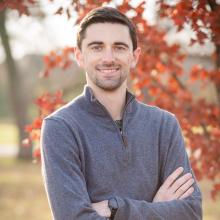
Ph.D. Candidate | Accounting
Last March, McCombs faculty and doctoral students gathered for “McCombs Madness,” a double-elimination ping-pong tournament created by Accounting Ph.D. candidate and Harrington Fellow Nathan Herrmann.
“The quality and camaraderie of the faculty and students in the accounting department was probably the biggest factor that attracted me to UT,” Herrmann said. “I was impressed that the faculty were not only considered to be at the top of their fields but also seemed to engage with and care for the doctoral students.”
Gowtham Velu (he/him)
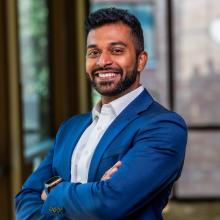
Masters Student | Texas Evening MBA Program
First-year Texas Evening MBA student Gowtham Velu supports strategic procurement for advanced AI servers in his full-time job as a Supply Chain Manager at Dell Technologies. He aims to use strategic management and sustainable business practices to make a positive impact in technology and supply chain operations.
“Working with global companies like Dell has given me a unique perspective, allowing me to contribute meaningfully to my MBA experience,” Velu said. “It's been incredibly rewarding to see how my diverse industry experiences and the knowledge gained at McCombs are coming together to drive meaningful change in sustainable business practices.”
Aldo Galli (he/him)
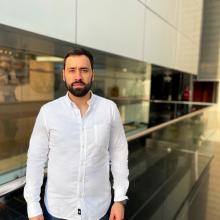
Masters Student | Business Administration
For McCombs MBA student Aldo Galli, it’s all about using the right tools at the right time. In 2023, Galli was selected as one of MIT’s Innovators Under 35 Latin America for his startup, Cocarbon. Cocarbon sustainably produces activated carbon from agricultural waste to enhance water quality in cities and remote areas.
Galli’s work proves that sustainable solutions can be cost-effective, efficient and scalable, even built in spaces with much less resources or efficient institutions than in the US. The supportive environment at UT-Austin, combined with its local resources and circular economics, lays the perfect groundwork for scaling such an urgent project.
Prateek Mahajan (he/him)
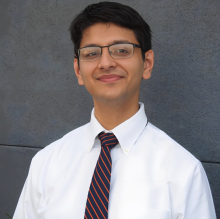
Ph.D. Student | Finance
Inspired by his work at a forensic finance consulting firm before grad school, Prateek Mahajan now studies finance as a fourth-year Ph.D. student in the McCombs School of Business. He is currently investigating finance-related challenges ranging from identifying fraud in government programs and inflated valuations in auto asset-backed securities to understanding the drivers of shrinking homeownership rates.
His first paper, co-authored with two UT finance professors, Drs. Griffin and Kruger, examined the Paycheck Protection Program (PPP), a COVID-era government stimulus program targeted at small businesses, for signs of fraud. Analyzing over a dozen different data sources, they were able to identify fraudulent activity in over 1.4 million loans representing more than $64 billion in taxpayer money.
Moody College of Communication
Jeewon (Joanne) Kim (she/her)

Ph.D. Candidate | Advertising
“I’m interested in how we can design and talk about technology in ways that benefit society while staying practical and effective,” Jeewon (Joanne) Kim, third-year Ph.D. candidate in the Stan Richards School of Advertising & Public Relations, said. “My research focuses on how consumers perceive and interact with new media and how those interactions shape their behavior and influence advertising effectiveness.”
Before studying at UT, Kim spent over five years as a research analyst and consultant at multinational consulting firms and later as a community marketing specialist at a global sportswear retail company.
Aaron Lopez (he/him)

Masters Student | Screenwriting
With his screenplay "Polar Night”, screenwriting M.F.A. student Aaron Lopez represents UT as one of ten semifinalists in the 2025 Humanitas College Drama Awards. This past summer, 10 semifinalists per genre were selected from around 400 applications collectively representing 80 colleges across the country.
“I’ve always liked watching movies and wanted to find a creative outlet that let me incorporate various interests and skills,” Lopez said. “Screenwriting and filmmaking are great ways to explore the art of storytelling through a visual medium that can’t be replicated anywhere else.”
Yenny Kang (she/her)
Masters Student | Media Studies
t’s thanks to second-year master's student Yenny Kang that some of your favorite South Korean films have reached US audiences. Before studying in the Department of Radio-Television-Film, Kang worked at CJ ENM distributing South Korean films and TV shows to US streaming platforms like Tubi and Amazon.
“I found myself questioning why we worked in certain ways,” Kang said. “This made me want to come back to school to study the media theories that could help explain ‘why,’ and conduct research that ties those theories to my practical experience.”
Andrea Lim (she/her)
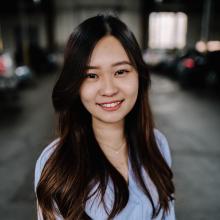
Ph.D. Student | Advertising
From viral memes and BookTok fandoms to Formula 1 drama and social media crises, Andrea Lim is turning internet culture into academic inquiry. A second-year Ph.D. student in the Stan Richards School of Advertising and Public Relations at UT Austin, Lim brings a unique lens to the intersection of fandom, identity and digital communication.
An international student, Lim combines her personal interests with scholarly depth, exploring how parasocial relationships, online communities and branding influence consumer behavior and public perception. With a strong foundation in strategic communication and a passion for storytelling, she’s carving a path that bridges pop culture and impactful research.
Mauricio Hernández Serrano (he/him)
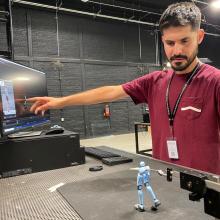
Masters Graduate | Film Production
“Stop-motion animation is traditionally time-consuming and costly,” Mauricio Hernández Serrano (MFA ‘25) said. “My work focuses on making it more practical by turning everyday objects into characters, using recycled materials for sets and props, and finding clever, low-cost solutions instead of relying on expensive technology.”
Hernández Serrano came to Moody as a Fulbright Scholar from Mexico, and completed his thesis film this past summer. With Assistant Professor Korey Pereira, Hernández Serrano mixed the sound for his thesis film in Dolby Atmos to create an immersive, three-dimensional audio experience.
Ann Laudick (she/her)

Ph.D. Student | Media Studies
Prior to pursuing graduate study at The University of Texas at Austin, Ann Laudick had a career in feature film and television production as a second assistant director, location coordinator and producer. Her projects included “Minari” and “Reservation Dogs."
Now a fourth-year Media Studies Ph.D. student in the Department of Radio-Television-Film, Laudick volunteered to assist curator Steve Wilson with the exhibition “Live from New York: The Lorne Michaels Collection” at the Harry Ransom Center. The exhibition documents Michaels' career in television from his earliest writing up through and including the nearly 50-year history of “Saturday Night Live,” the most Emmy Award-nominated show in television history.
Oden Institute for Computational Engineering and Sciences
Rodrigo Gonzalez Hernandez (he/him)
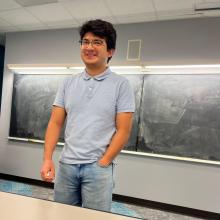
Ph.D. Candidate | Computational Science, Engineering, and Mathematics
“Understanding the effects from collisions of charged particles is a key issue in plasma physics,” Rodrigo Gonzalez Hernandez, fourth-year Ph.D. candidate at the Oden Institute, said. “Simulating the evolution of plasmas is a very challenging, yet important problem. During my Ph.D., I have spent most of my time developing computer simulations of this phenomenon.”
Supported by a NIMS Fellowship, Gonzalez Hernandez is developing state-of-the-art algorithms that calculate the evolution of a plasma, particularly when particles are accelerated to relativistic speeds. At Oden, his advisor, Dr. Irene Gamba, and other colleagues in the Ph.D. program have contributed to his research in significant ways. The tight-knit family of friends and colleagues in the program have been essential to his academic journey as an international student.
Nina De La Torre (she/her)
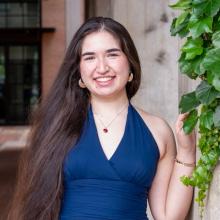
Ph.D. Student | Computational Science, Engineering, and Mathematics
“UT was my dream school for a long time,” Nina De La Torre, third-year Ph.D. student at the Oden Institute, said. “The CSEM program is perfect for me because it allows me to learn a large variety of topics and use mathematics to create computational models!”
This summer, De La Torre is interning at MathWorks, but during the school year, she focused her studies on the chemistry of star formation. Her computational models, which she has presented at the Cosmic Horizons Conference and Oden’s SCIML Workshop, describe the chemical composition of a star-forming region at a given time.
Vignesh Sella (he/him)

Ph.D. Student | Computational Science, Engineering, and Mathematics
Third-year CSEM student Vignesh Sella has put his Ph.D. studies on pause...for an internship at Google X! Sella is currently an AI Research Scientist Resident, where he’s working on AI/ML modeling for a project involving finance, decarbonization technologies and climate.
"The data-driven modeling and multi-disciplinary nature of the work fit perfectly with my education as a computational scientist at the Oden Institute,” Sella said. “The Oden Institute is a rare institution which exists as a cross-functional place between many fields – reflecting computational science in general.”
College of Education
Yanbing Zhou (he/him)
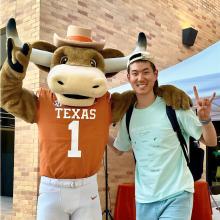
Ph.D. Student | Exercise Physiology
You might have seen Yanbing Zhou before...at the Olympic Games opening and closing ceremonies. Prior to pursuing a Ph.D. in exercise physiology, Zhou was a professional DanceSport athlete for 20 years. His career ignited a passion for promoting an active lifestyle, through cardiovascular health. During the first year of his Ph.D. as part of the Cardiovascular Aging Research Laboratory, he has been supported by a Harrington Fellowship.
“My Ph.D. research explores how cardiovascular health is influenced by external factors such as exercise and chronic inflammatory diseases,” Zhou said. “One of my studies focused on patients with conditions called large vessel vasculitis, where inflammation affects major arteries. The preliminary results showed that their arteries, instead of widening as expected during increased blood flow, actually narrowed, which indicates impaired vascular function.”
Aigerim Alpysbekova (she/her)
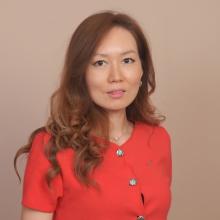
Ph.D. Candidate | Health Behavior and Health Education
“One of my favorite memories came during a doctoral seminar when a professor said, ‘The most important part of this journey isn’t just the research—it’s the people,’” said Aigerim Alpysbekova, fourth-year Ph.D. candidate in health behavior and health education. “That moment shifted my perspective. It reminded me to value the friendships and connections that will last long after the degree is earned.”
Alpysbekova, who recently received a Graduate Recognition Fellowship, studies mental health among crisis-affected migrant populations, specifically Ukrainians impacted by the 2022 Russian invasion. Alpysbekova and her team in the College of Education coined the term “perseverative worry”—an ongoing anxiety about the safety of family members left behind in Ukraine.
Erin Crownover (she/her)
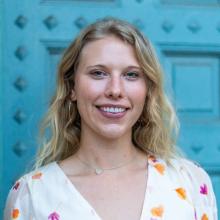
Ph.D. Candidate | Physical Culture and Sport Studies
A former collegiate athlete, Erin Crownover brings her A-game to uncovering the history of the athletic training profession and its origins at UT-Austin. A fourth-year Ph.D. candidate in physical culture and sport studies in the College of Education, Crownover focuses on three key figures in the history of athletic training at Texas: Henry “Doc” Reeves, Frank Medina and Christina Bonci.
“The field of athletic training has long been an outlier in sports medicine, striving for representation due to the lack of doctor status among practitioners,” Crownover said. “The stories of Reeves, Medina and Bonci provide a window into the history of the broader impact of the profession’s development in the 20th century.”
Jackie Yang (he/him)
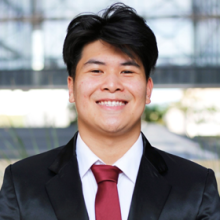
Ph.D. Student | Counseling Psychology
Jackie Yang is a first-year Ph.D. student studying counseling psychology in the College of Education. He was drawn to this field because of its holistic approach, incorporating mental health, social justice and advocacy elements. His research projects have covered a range of topics:
“In my first publication, we found that digital dating abuse, a form of intimate partner violence, is linked with external and internal stressors experienced by gay and bisexual men - the external stressor being discrimination and the internal stressor being internalized homophobia. I assisted on a second publication related to the demographic and behavioral factors associated with kratom usage, a traditional medicine in Thailand and Malaysia that produces a stimulant effect similar to opioids. The study demonstrated that White men and sexual minorities are at an increased risk for using kratom. These were very important findings for us.”
Cockrell School of Engineering
Emma Palmer (she/her)
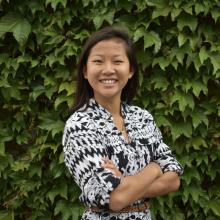
Ph.D. Student | Environmental and Water Resources Engineering
Emma Palmer, who is in the last year of her Ph.D. in environmental and water resources engineering, is passionate about understanding fundamental environmental interactions and the impacts on sustainability and human health.
Palmer's research in biogeochemistry, which has been supported by both a Harrington Fellowship and a National Science Foundation Graduate Research Fellowship, examines the ways that bacteria in soil-water systems interacts with minerals.
“I am specifically investigating the mechanisms that bacteria use to 'breathe' iron in rocks when oxygen is not available for respiration,” Palmer said. “This fundamental research is important because iron species chemically interact with other constituents we care about in soil-water systems. For example, iron minerals can absorb groundwater pollutants that would be hazardous for humans to drink.”
Iman Salafian (he/him)
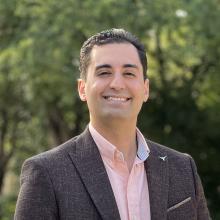
Ph.D. Candidate | Mechanical Engineering
Premature infants admitted to the NICU have extremely delicate skin, making traditional skin-mounted vital signs monitoring sensors and respiratory support masks challenging and harmful. While at UT, fourth-year Ph.D. candidate in mechanical engineering, Iman Salafian, and his collaborators have developed a novel medical device to solve this problem—a device which is now patent-pending.
“Our device, Trinity Tube, is a multifunctional nasogastric feeding tube that enables feeding, vital signs and respiratory monitoring in one seamless device, using sensors integrated into a typical feeding tube,” Salafian said. “Trinity Tube eliminates harmful skin-attached sensors and improves respiratory monitoring necessary for the survival and proper growth of neonatal patients.”
Lea El Khoury (she/her)
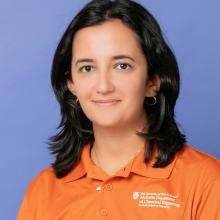
Ph.D. Candidate | Chemical Engineering
When San Diego residents were concerned about sewage-related air contamination from a nearby river, Lea El Khoury, Ph.D. candidate in the McKetta Department of Chemical Engineering, stepped in to investigate. Her data played a role in prompting local authorities to act on improving air conditions in San Diego.
“My work helps to highlight areas where air pollution is a serious concern,” El Khoury said. “It provides scientific evidence to support better environmental policies that promote cleaner air and healthier communities."
Nirmalay Barua (she/her)
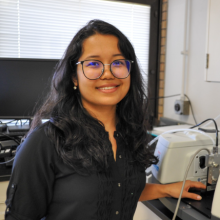
Ph.D. Student | Materials Science and Engineering
Nirmalay Barua is a third-year Ph.D. student from Bangladesh studying gas sensing devices in the Materials Science and Engineering program. One of her current projects involves designing a smart mask for monitoring respiratory parameters in patients suffering from chronic obstructive pulmonary disease (COPD), a leading cause of death globally.
Nirmalay’s proposed solution to managing COPD is BreathIQ, an AI-driven device providing remote access to pulmonary rehabilitation. It allows COPD patients to perform exercises with interactive instructions and receive feedback wherever they are. UT has been integral to nurturing and advancing Nirmalay’s research interests by providing excellent facilities and a collaborative atmosphere for doing innovative work.
Greg Holste (he/him)
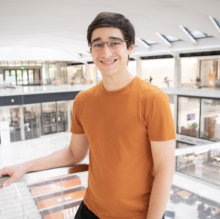
Ph.D. Student | Electrical and Computer Engineering
Greg Holste has always been drawn to data analysis. Now a third-year Ph.D. student in the Department of Electrical and Computer Engineering, he is leveraging that skill to advance his research on medical artificial intelligence (AI). His most recent project focuses on detecting aortic stenosis (AS), a cardiac disease typically diagnosed using Doppler echocardiography.
Greg and his research team at UT, in collaboration with Dr. Rohan Khera at the Yale School of Medicine, developed an AI model capable of automatically detecting severe AS using 2D echocardiography without Doppler. He credits UT, specifically the VITA group, with helping him advance his research.
Weixin Guan (he/him)
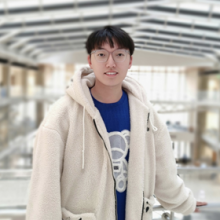
Ph.D. Student | Materials Science and Engineering
Weixin Guan has always been interested in sustainability. As a chemical engineering major during his undergraduate years, he discovered the critical role materials innovation plays in pushing engineering practice to the next level. Now, as a second-year Ph.D. student studying materials science and engineering at the Texas Materials Institute at UT, he’s doing just that.
His current research is focused on solving the world’s growing water shortage problem. Two-thirds of the world’s population face some level of water scarcity, which has become especially critical in arid and inland areas. To address this, Weixin’s work is focused on atmospheric water harvesting - finding ways to extract and regenerate atmospheric water (also known as moisture) from the air we breathe.
College of Fine Arts
Nadia Milad Issa (they/them/theirs/elle)

Masters Student | Dance
“The MFA Dance graduate program has carved out new possibilities for me,” Nadia Milad Issa, second-year M.F.A. student in dance, said. “I sincerely appreciate that my niche expertise in Afro-Cuban and Haitian Folkloric dance was met with openness, encouragement and excitement.”
Issa’s thesis project explores the impacts of religious racism across the African diaspora, specifically Afro-Brazilian Orixá and Afro-Cuban Orisha practitioners, and the long history of Black church arsons in the U.S. South. This summer, they received the Provost’s Scholarship for Dance Excellence.
Anna Marinela Lopez (she/her)
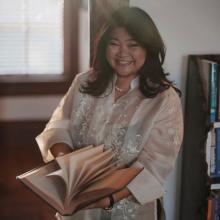
Ph.D. Student | Historical Musicology
“I study how we, as a nation, ‘hear’ the United States,” Anna Marinela Lopez, fourth-year Ph.D. student in historical musicology, said. “How do other people create their identities with song and sound? What sounds define a nation? How can a nation built up of various identities find a national sound?”
Lopez’s dissertation examines a niche field of study in musicology: theme park music. By analyzing the songs, genres and styles performed by the live music ensembles at Disney’s themed lands, such as Frontierland, Lopez seeks to understand how Disney creates conceptions of an American identity through music.
Annase Raji (she/her)

Masters Student | Drama and Theatre for Youth and Communities
Growing up in rural Nigeria, where storytelling and performance were vital tools for connection, Annase Raji saw firsthand how theatre could educate, heal and empower. Now a second-year M.F.A. student studying drama and theatre for youth and communities in the Department of Theatre and Dance, she explores how drama therapy can help immigrant youth build stronger connections across cultural divides.
“What I found is that drama workshops give these youths a safe and creative space to express their feelings, share their stories and better understand both their own identities and those of others,” Raji said. “Participants gained more confidence, developed empathy for people from different cultures and began to break down the misunderstandings that often exist between cultural groups.”
Draconis von Trapp (he/him)
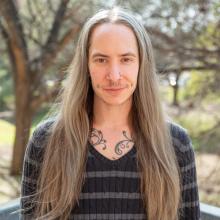
Ph.D. Student | Performance as Public Practice
Having begun belly dancing as a teenager, Draconis von Trapp, second-year Ph.D. student in performance as public practice, is now booked all over the world as not just a performer and teacher, but as a belly dance historian.
“My research focuses on fusion belly dance, an American diasporic style that draws heavily from Middle Eastern and North African dance traditions,” von Trapp said. “I’m particularly interested in tracing the lineage of stylistic influences and highlighting the contributions of male dancers, figures who are often left out of the historical record.”
Chasitie Brown (she/her)

Ph.D. Candidate | Art History
“It is a privilege to work with not only professors in my home department in art history, but from other fields such as literature, history and ethnomusicology," said Chasitie Brown, a Harrington Fellow and fifth-year Ph.D. candidate in art history. “This interdisciplinary approach has expanded the horizons of my research, leading to more comprehensive findings.”
Brown’s dissertation examines “Queloides,” a group of art exhibitions in 1990s Cuba focused on questions of race and identity. The name “Queloides” references marks as a result of lashings and other forms of violent punishment on enslaved Afro-descendants in the colonial period.
Jackson School of Geosciences
Bella Gray (she/her)
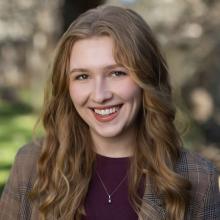
Ph.D. Student | Geosciences
Bella Gray can often be found wading through thick thorn bushes, crawling under barbed wire fences, and evading jumping spider colonies. For her, it’s just another day exploring the Guadalupe Mountains as a Ph.D. student in geosciences.
“Field work always creates the perfect environment for fun memories,” Gray said. “Whatever we have to do is always worth it for the science.”
A burgeoning geomorphologist, Gray uses numerical modeling, remote sensing and field surveys to study how sediment influences vegetation growth, erosion, deposition and channel shape in ephemeral rivers, specifically in drylands.
School of Information
Suzie Wright (Garcia) (she/her)
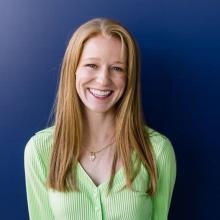
Masters Student | Information Studies
Before beginning the MSIS program in the School of Information, second-year student Suzie Wright (Garcia) was an elementary school teacher pivoting into event planning.
“At first glance, teaching and event planning seem like totally different worlds, but both are rooted in understanding people’s needs and creating experiences around them,” Suzie said. “That’s what drew me to UX Design and Research: it felt like a natural next step to keep solving real-world problems for real people.”
Ishita Chitturi (she/her)
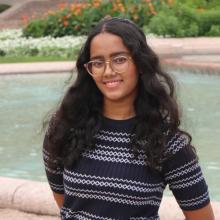
Masters Student | Information Studies
Students with mobility disabilities may struggle to navigate campus, encountering inaccessible routes and other unpredictable challenges. Ishita Chitturi, second-year master’s student in information studies, is part of a team working to change that at Longhorn Developers. Their app, Mobilize UT, will feature an accessibility map with crowd-sourced updates, community reviews and social features.
“Throughout my graduate program so far, I have had the privilege of working with people from different cultural, social and academic backgrounds,” Chitturi said. “This has greatly informed my approach of designing with the interest of people, culture and communities being at the core of my design undertakings.”
Chelsea McCullough (she/her)
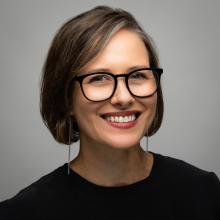
Ph.D. Candidate | Information Studies
“After interviewing residents about their experiences in Austin, one thing is clear – no one likes traffic!” Chelsea McCullough, fourth-year Ph.D. candidate in the School of Information, said. “I study how people experience their city, what they think about those experiences, and ways that they engage with others (including local government) and express their ideas.”
McCullough builds upon her professional experience, critically addressing “smart cities,” which integrate digital technology into city operations, often with ambiguous results. Her research aims to prioritize residents' voices rather than technology's imagined promises.
Anjali Singh (she/her)
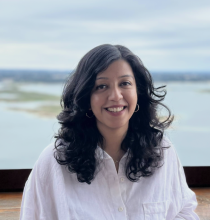
Postdoctoral Fellow | School of Information
“I have always been fascinated by what makes learning truly meaningful,” said Anjali Singh, Bullard Postdoctoral Fellow at the School of Information. “Deep and effective learning requires effort—making mistakes, learning from them and practicing regularly.”
Singh studies how to help students think more critically about the information generated by Generative AI (GenAI) tools. She recently conducted a study exploring how students use GenAI tools when presented with cues that encourage them to pause and reflect. She is now developing an AI tool that provides personalized cues to guide learners in becoming more thoughtful and intentional in their search process.
Xinyue “Sally” You (she/her)

Ph.D. Student | Information Studies
Xinyue “Sally” You has always been interested in why people behave and interact the way they do, especially as it relates to immersive technology. Sally is in her second year as a Ph.D. student in the School of Information and spends her time exploring this complex human-technology relationship.
Her current study examines the psychology behind why people hesitate to try new experiences that initially seem uncomfortable, like when avatars walk through each other in virtual reality.
An international student from China, Sally was drawn to UT for many reasons, including Austin’s vibrant culture and her program’s cross-departmental, interdisciplinary approach to research.
College of Liberal Arts
Qing Yao (he/him)

Ph.D. Student | Computational Linguistics
“The sentences ‘I gave her the pen I found on my desk yesterday’ and ‘I gave the pen I found on my desk yesterday to her’ convey roughly the same event, but the first sounds more natural,” said Harrington Fellow Qing Yao, first-year Ph.D. student in computational linguistics. “Language models pick up these preferences very well, but are they simply ‘memorizing’ them from the vast amounts of training data?”
Yao trained small language models on carefully controlled training sets, such as by reversing the usual order of phrases. His research illuminates how computational models can inform our understanding of the cognitive processes involved in language.
Eliane Nascimento (she/her)
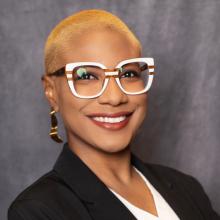
Ph.D. Student | African & African Diaspora Studies
“I’ll never forget my first days at UT, feeling amazed by the beauty of the surroundings. It was such a proud and joyful moment for me.”
Eliane Nascimento, a fourth-year Ph.D. student in African and African diaspora studies, has dedicated part of her time at UT to the international student community. In March 2024, she founded the Afro-Latin Student Association (ASA), which currently hosts the monthly panel series "Talk to Afro-Latin Researchers." Resources for international students, such as Texas Global, have been instrumental to Nascimento’s success at UT.
Carlos Morales-Aguilar (he/him)
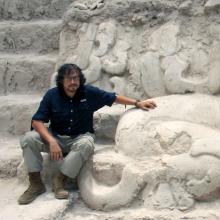
Postdoctoral Fellow | Department of Geography & the Environment
“The thought of stepping into the unknown, peeling back layers of history, exploring, and revealing ancient buildings that have been hidden beneath the forest canopy for centuries has always sparked my imagination.”
Carlos Morales-Aguilar, postdoctoral fellow in the Department of Geography and the Environment, uses cutting-edge technology to turn imagination into reality. As part of the UT LLAMA Lab, he uses LiDAR technology to generate 3D maps that reveal the landscapes of ancient civilizations. This allows the Lab to pinpoint areas of interest before they travel on-site to excavate.
Anna Bokun (she/her)
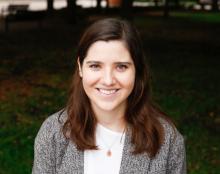
Postdoctoral Fellow | Population Research Center
Sociology and demography enable us to understand the hidden structures shaping our communities. Dr. Anna Bokun is a postdoctoral researcher at UT's Population Research Center, where she bridges data with theory to examine major life transitions—caregiving, fertility, and aging—to understand how families navigate financial and emotional challenges.
“Across all my work, I’m asking: How do families adapt to life’s biggest challenges?” Dr. Bokun said. “What policies help, or fail them? By studying these questions, I hope to inform solutions that support families' economic wellbeing across the life course. For example, many family caregivers face significant financial burdens, yet social policies often fail to recognize or support them adequately."
Erin Kelleher (she/her)
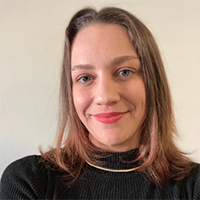
Ph.D. Student | Middle Eastern Studies
As a freshman in college, Erin Kelleher remembers watching the Arab Spring unfold across much of the Middle East and North Africa. Curious to learn more about the region, she signed up for her first Arabic course. Erin is now pursuing a Ph.D. in the Department of Middle Eastern Studies in the College of Liberal Arts. Her research focuses on the cultural and social history of late nineteenth- and early twentieth-century Egypt.
“I chose to study at UT because of my department’s emphasis on a regional understanding of the Middle East. Because I am interested in intersections of Ottoman and Arab histories, and the places where these histories are intertwined, this aspect of the department’s approach to the region really resonated with me.”
Isabelle Clark (she/her)
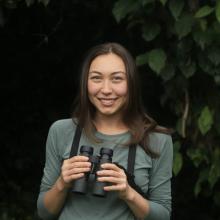
Ph.D. Candidate | Biological Anthropology
Izzi Clark has always been fascinated by animal behavior and ecology. After studying wild lemurs in Madagascar as an undergrad, she became incredibly drawn to primates by their rich social lives and evolutionary proximity to humans.
Before coming to UT, Izzi was a research assistant for the Ngogo Chimpanzee Project, where she met her now-advisor and mentor, Dr. Aaron Sandel. Ngogo – once the largest group of chimpanzees ever studied – was splitting into two smaller groups, causing a hostile territorial conflict. Her deep interest in understanding the causes and consequences of this rare split brought her to UT where she is now a fifth-year Ph.D. candidate studying biological anthropology in the College of Liberal Arts.
College of Natural Sciences
Mariana Rivera-Higueras (she/her)
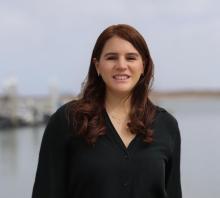
Ph.D. Candidate | Marine Ecology
Cryptobenthic fish are known for their short lifespans, rapid reproductive cycles and preference for specific microhabitats within the larger coral reef. But these tiny, under-researched fish answer a key question that has long left scientists scratching their heads: How did coral reefs become the most biologically diverse marine ecosystems?
Fourth-year Ph.D. candidate Mariana Rivera-Higueras is diving deeper at The University of Texas at Austin Marine Science Institute (UTMSI) in Port Aransas. She is the first to describe the cryptobenthic fish community in the southwest reef systems of the Gulf near her hometown of Veracruz, Mexico, and the first to compare cryptobenthic fish communities in the Caribbean.
Emma Ryan (she/her)

Ph.D. Student | Biochemistry
“In my first year at UT, I’ve been privileged to experience inviting environments where world-class research is happening,” said Emma Ryan, first-year Ph.D. student in biochemistry. “UT has an amazing research ecosystem that has contributed immensely to immunology and translational therapeutics research.”
Ryan’s goal is to make better vaccine candidates to block infection, by engineering protein-based therapeutics. Her research, supported by a Harrington Fellowship, involves studying the structures of proteins that members of the Phenuiviridae family use to infect cells. If common design strategies are identified across different viruses in this family, they can be rapidly implemented if a novel Phenuiviridae virus becomes an epidemic.
Zexi Zhou (she/her)
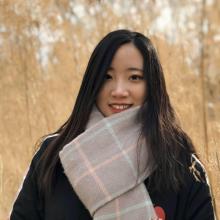
Ph.D. Candidate | Human Development & Family Sciences
“People often think older adults don’t need as much sleep, but that’s actually a myth,” said Zexi Zhou, fourth-year Ph.D. candidate in human development and family sciences. “While their sleep often becomes lighter and more fragmented, they still need about the same amount of rest as younger adults. And that sleep really matters.”
Zhou found that when older adults sleep better, they tend to worry less, bounce back from negative moods more easily and have more enjoyable interactions with others, especially with close friends and family.
Kate Windsor (she/they)
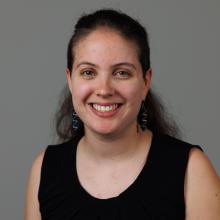
Ph.D. Student | Cell and Molecular Biology
Cell and molecular biology Ph.D. student Kate Windsor strives to grow not only as a scientist, but as a science communicator. They recently presented their neuroscience research to middle school and homeschool centers across Austin, as part of the “Present Your Ph.D.” program.
“It was great to see middle schoolers be curious and engaged,” Windsor said. “Because that’s the age I was when I started getting interested in studying brains.”
Windsor is the host of “She Blinded Me With Science,” a science show on KVRX 91.7, to interview UT researchers. They also voice the “Slow-Moving Time Machine” on the podcast Memory Static. When they're not on the radio, they're in the lab studying manganese neurotoxicity.
John Michael Clark (he/him)
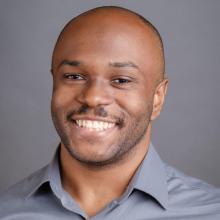
Ph.D. Student | Mathematics
Fourth-year Ph.D. student John Michael Clark recently attended the Arizona Winter School in Tucson for the second time, where advanced graduate students work with senior faculty and postdoctoral fellows on research projects related to number theory. Last spring, Clark was invited to join a project group at AWS related to his work in arithmetic dynamics. He recently submitted a paper based on the breakthroughs achieved at the conference.
“I’ve always had a knack for mathematics and couldn’t see myself doing anything else,” Clark said. “Even though the work has been tough, I am glad that I am here.”
Ayesha Mahmood (she/her)
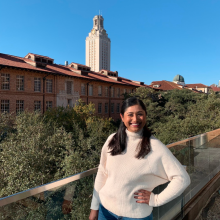
Ph.D. Candidate | Microbiology
Ayesha Mahmood, a fourth-year Ph.D. candidate studying microbiology in the College of Natural Sciences, finds bacteria extremely captivating.
“Picture something so minuscule yet incredibly sophisticated - a microcosm akin to a bustling city with all its intricacies. Each bacterial cell is complex, and when you consider the interactions of bacteria with their environment, other microorganisms and how they cause illnesses in humans, the potential for comprehension seems boundless. We find ourselves constantly battling these microscopic entities, but we are losing. I want to make sure that doesn’t happen.”
The main goal of Ayesha’s research is to understand how antibiotic resistance-causing proteins produced by bacteria evolve, and to explore strategies to hamper this evolution, which, in 2019, contributed to 1.27 million deaths worldwide.
School of Nursing
Namuun Clifford (she/her)

Ph.D. Candidate | Nursing
“During the pandemic, I saw firsthand how digital tools could increase access to care and support patients managing chronic conditions,” Namuun Clifford, fourth-year Ph.D. candidate in nursing, said. “I was drawn to research that uses data and technology to reduce health disparities and improve health outcomes for underserved communities.”
Stedman Holliman (he/him)
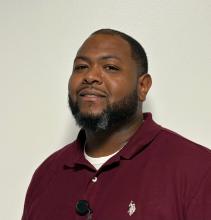
Master's Student | Psychiatric/Mental Health Nurse Practitioner
“Before I became a nurse, I served in the Army for over 15 years,” Stedman Holliman, third-year master’s student in the School of Nursing, said. “Around my sixth or seventh year, I began to realize that our military has a serious mental health issue. When I was set to retire, I began looking for educational opportunities that focused on mental health.”
Holliman, who currently works as a registered nurse, was recently selected as a Board of Directors Scholar by the American Psychiatric Nurses Association. He is in the early stages of research on the use of stimulants in children and adolescents with ADHD.
Amanda Boardman (she/her)
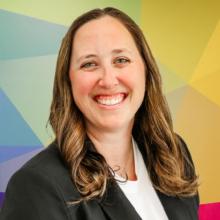
DNP Candidate | Nursing Practice
“At UT, your professors are your biggest supporters,” Amanda Boardman, second-year doctor of nursing practice (DNP) candidate in the School of Nursing, said. “If you can dream it, and are willing to work at it, you have people cheering you on and helping you reach your goals.”
A longtime Longhorn and school nurse, Boardman is now on her third nursing degree from UT. She has always been devoted to creating the best healthcare experience for pediatric care patients, and is currently President Elect of the National Association of Pediatric Nurse Practitioners. At UT, she’s most appreciated the chance to collaborate with fellow nurses and develop practical skills to shape the healthcare system for the better.
Lyndon B. Johnson School of Public Affairs
Antonia Vazquez (she/her)
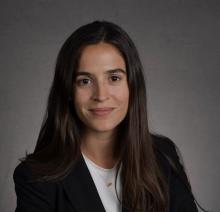
Ph.D. Candidate | Public Policy
“Growing up in Argentina, I witnessed firsthand how policy decisions, often made without sufficient evidence, can shape people’s lives,” said Antonia Vazquez, fifth-year Ph.D. candidate in public policy at the LBJ School of Public Affairs. “The LBJ School offered what I was looking for: rigorous training in empirical methods combined with opportunities to work on pressing policy issues, especially those affecting Latin America and underserved communities.”
Vazquez’s research focuses on understanding the effect of public policies and environmental factors on mental health and well-being. In one project, co-authored with Yumin Hong, a Ph.D. student in the Department of Economics, she found that hotter temperatures in Mexico are linked to a rise in emergency room visits for mental health issues. In another set of studies, she's studying low-cost mental health interventions using mobile apps.
School of Social Work
Khamron Micheals (he/him)
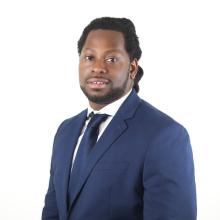
Postdoctoral Fellow | School of Social Work
Before attending UT Austin as a postdoctoral fellow, Khamron Micheals was a respiratory therapist at the bedside of critically ill patients in the Texas Medical Center. While caring for patients on the front lines, Micheals was also learning about the broader systems, such as housing, income and access to care, that influence sickness and recovery time.
Now a postdoctoral fellow in UT’s School of Social Work and Dell Medical School, Micheals’ current research focuses on understanding why some children experience worse asthma outcomes than their peers.
Jake Samora (he/him)
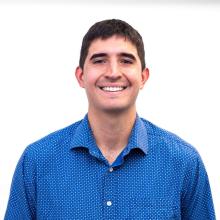
Ph.D. Student | Social Work
Amidst the opioid overdose crisis, third-year Ph.D. student Jake Samora has been conducting community-engaged research with people who use drugs (PWUD) and providers of substance use disorder services, a challenge further complicated by pandemic-related disruptions. Through this work, he’s observed barriers to accessing evidence-based treatment for substance use.
“In research examining opioid use and overdose, we have found that there are multiple barriers to accessing prevention and treatment services for people who use drugs,” Samora said. “This includes fear of legal repercussions, limited support for services to meet the needs of PWUD and policy-related barriers to providing evidence-based interventions.”
Madison Haiman (she/her)
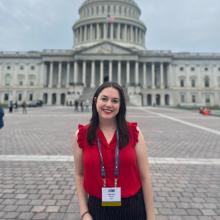
Ph.D. Candidate | Social Work
“I explore how maternal and reproductive health policies and other contextual factors influence the health, care experiences and overall well-being of pregnant and parenting people,” Madison Haiman, fourth-year Ph.D. candidate in the School of Social Work, said. “I conduct research on perinatal substance use policy because I believe every person deserves a safe, supported and empowering pregnancy and parenting experience.”
Haiman’s research is on perinatal substance use—substance use during pregnancy and the year following birth. She has been supported by both Continuing and Recruitment Fellowships from the Graduate School, and experiential fellowships from AcademyHealth, the Council on Social Work Education and the American Public Health Association.
Kaitlyn Swinney (she/her)
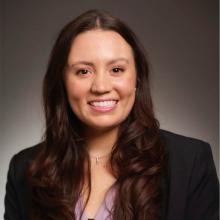
Postdoctoral Fellow | School of Social Work
A child’s walk to school is a great way to incorporate physical activity and cardiovascular fitness into their daily routine. However, in the United States, only about 11% of children currently walk or bike to school, according to the National Household Travel Survey. Kaitlyn Swinney, second-year postdoctoral fellow in the School of Social Work, wants to know why.
“Parents’ beliefs are strongly associated with whether their child actively commutes to school for elementary school children,” Swinney said. “Additionally, I have been looking at how access to environmental features like parks and sidewalk lengths (both associated with higher physical activity) differ by proportion of minority residents living in the area.”
Cheng Chow (he/him)
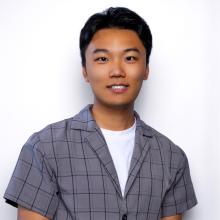
Ph.D. Student | Social Work
“My experience as a first-generation immigrant motivates me to serve marginalized communities with social work policy and practice,” Cheng Chow, first-year Ph.D. student in the Steve Hicks School of Social Work said. “UT Austin has provided me with an incredible platform to pursue research that is both personally meaningful and impactful for underserved communities.”
Chow’s research examines how immigration policies, healthcare access and social structures impact the well-being of immigrant communities. By understanding these dynamics, Chow hopes we can better design policies that promote equity and improve health outcomes for all populations. His work has been supported by a Graduate School Recruitment Fellowship.
Michener Center for Writers
Amy Catherine Vouvray (she/her)
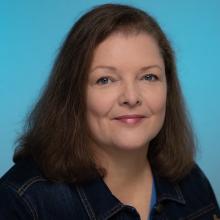
Masters Student | Screenwriting and Fiction
It’s a lot of work to reach post-production on a feature film, query agents for a novel or begin writing a stage musical. Catherine Vouvray, now a third-year fellow in screenwriting and fiction at the Michener Center, did it all in the same year.
“I was attracted to the Michener Center because students are not confined to one genre or medium,” Vouvray said. “You can study in Moody, Fine Arts, Liberal Arts and beyond, with fantastic professors and working professionals."
Daphne DiFazio (she/her)
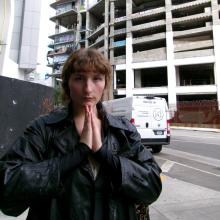
Masters Student | Poetry
“I decided to attend UT because the faculty members at the Michener Center for Writers and The New Writers Project are incredible poets, educators and editors to work with,” Daphne DiFazio, second-year Michener fellow, said. “I appreciate receiving support from a program designed to hone and support my writing in the ways I want to make it.”
DiFazio, who was recently nominated for the Pushcart Prize and Best New Poets, has been published in bath magg, DIAGRAM and Foglifter. She has recent and forthcoming poems in the zine Nopal.
Jessie Li (she/her)

Masters Student | Fiction and Poetry
“When I was a child, my father used to make me recite Tang Dynasty poems,” Jessie Li, second-year Michener fellow in fiction and poetry, said. “From those poems, I learned music and rhythm, form and precision. I attribute my love of words in part to that early experience.”
Li’s short story “Mouth and Heart” was a 2025 winner of the PEN America Robert J. Dau Short Story Prize for Emerging Writers. In May, she received a Keene Prize Honorable Mention. An admirer of Leo Tolstoy and Jhumpa Lahiri, Li gravitates towards stories about families, relationships and coming-of-age.
Darius Atefat-Peckham (he/him)
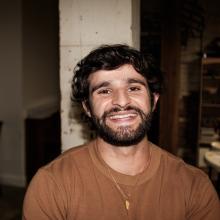
Masters Student | Poetry
“I believe great writing is great sincerity,” Darius Atefat-Peckham, third-year poetry fellow at the Michener Center for Writers, said. “To have the courage to share some large or small part of yourself at all, and to have the curiosity and empathy to try to understand someone else and their unique perspective.”
Last year, Atefat-Peckham published his first poetry collection, “Book of Kin,” with Autumn House Press. As a first-year student, he was a finalist for the Keene Prize. A voracious reader as a child, books helped him forge a connection with both his birth mother, a poet herself, and Iran, the place of his heritage.